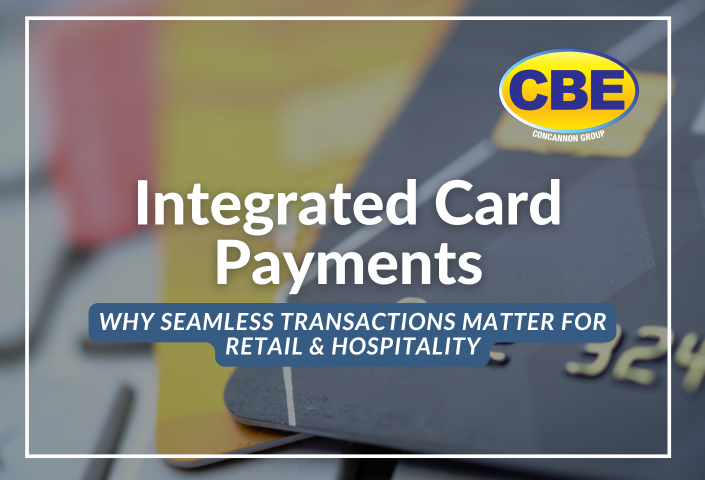Efficient payment processing isn’t a luxury, it’s a necessity. For businesses in retail and hospitality, every transaction contributes not just to revenue, but to customer satisfaction, staff productivity, and long-term loyalty. Integrated card payments can make the difference between a checkout that feels smooth and one that leaves customers frustrated.
What we mean by “integrated card payments”
Integrated card payments are systems that combine card acceptance, point-of-sale (POS), security, and in many cases back-office systems such as inventory, customer feedback, loyalty, and accounting into one unified platform. Rather than having disjointed hardware, separate terminals, or manual reconciliation, everything works together:
- Fast, secure card payments at counter or table
- Real-time reporting and reconciliation
- Less manual entry, fewer errors
- Ability to accept contactless, chip & PIN, mobile wallet, etc.
At CBE, our CBE Pay solution is designed with these integrations in mind, combining reliability, security, and ease of use so that retail and hospitality businesses can focus on serving customers rather than wrestling with payments.
Why seamless transactions matter: Key benefits
- Customer expectations are rising
Shoppers and diners expect frictionless, fast, and secure payment methods. Waiting in line because of a slow terminal, or being told “sorry we can’t accept mobile wallet” is damaging in a world where competitors are just around the corner. - Reduced abandoned sales
If payment takes too long, customers may cancel their order, either in physical line or online. A seamless system reduces friction, which means more completed sales. - Operational efficiency and cost savings
Integrated systems mean you eliminate duplicate entry, reduce reconciliation issues, minimise manual errors, and lower the risk of reconciliation or settlement delays. For hospitality especially, where speed matters such as table turnover and room service, this can translate into real savings and better staffing efficiency. - Better insights and business intelligence
With integrated payments, you get data in near real time. Which items sell best? When is peak traffic? Where are bottlenecks? That data helps you adjust staffing, promotions, pricing, and stock. - Improved security and compliance
Secure, PCI-compliant processing, encrypted data, and fraud detection are built in with modern integrated solutions. This reduces risk for both business and customer. - Greater flexibility
Modern card payment systems allow for multiple payment methods such as contactless cards, chip & PIN, and mobile wallets. They also support online and offline modes and can easily handle new requirements or upgrades. For example, in the UK contactless payment limits have increased in recent years, encouraging more customers to choose contactless over cash.
What the data says: Trends and statistics
To underscore how important seamless card payments are, here are some recent statistics and trends in the UK:
- The Card Expenditure Statistics Dashboard from UK Finance shows that while the total value of card spending in Q2 2025 was broadly flat year-on-year, the number of transactions rose by about 3%. That suggests people are making more, often lower value, card purchases.
- Contactless payments now account for over a quarter of all UK transactions, showing how central seamless technology has become to daily life.
According to the Office for National Statistics, domestic consumer card spending in tourism-related sectors such as restaurants, accommodation, and fast-food accounted for 6.1% of annual face-to-face spending in 2023. This underlines how essential integrated payments are in hospitality.
| Feature | Why it matters |
|---|---|
| Support for multiple payment methods (contactless, chip & PIN, mobile wallets) | Covers customer preferences, reduces friction at checkout, and helps capture more sales. |
| Fast transaction processing and reliable uptime | Reduces queue times and customer frustration, protecting loyalty and maximising throughput. |
| Integration with POS, inventory, loyalty, and accounting systems | Eliminates duplicate entry, reduces errors, and provides joined-up business insights for better decisions. |
| Good security compliance (PCI DSS, encryption, fraud detection) | Protects customers and the business, minimises fraud risk, and helps meet regulatory requirements. |
| Transparent fees and good settlement times | Prevents unexpected costs and improves cash flow, ensuring margins are predictable. |
| Customisable and scalable | Allows the solution to grow with the business and adapt as requirements change. |
How CBE Pay supports seamless transactions
Here’s where CBE Pay comes in:
- It brings together card acceptance, secure hardware and software, real-time reporting, and integrated reconciliation.
- Designed for retailers and hospitality providers, whether you have counter service, table service, or mobile service teams, CBE Pay supports the flows you need.
- Strong emphasis on reliability and service, minimising downtime and optimising speed.
- Simplifies compliance and security, reducing the burden on business owners.
Challenges and how to overcome them
Implementing integrated payments isn’t without its hurdles. Some common challenges include:
- Upfront cost and training: New hardware or software may require investment and staff training.
- Integration complexity: If your current systems are old or disparate, integrating them can be difficult.
- Security and regulatory burden: Compliance is essential, but keeping up with changes in payment schemes, data laws, or PCI requirements takes effort.
- Customer trust: For digital wallets or contactless, customers need to feel their data is safe.
To address these:
- Choose a provider that gives strong onboarding support and reliable customer service.
- Plan phased roll-outs so staff are comfortable and customers are informed.
- Monitor performance metrics such as speed of transaction, failure or retry rate, and queue times, so you can spot pain points.
- Keep communications clear with customers through signage and staff training.
Conclusion
Seamless, integrated card payments are no longer optional for retail and hospitality businesses that want to stay competitive, boost efficiency, and delight customers. They touch every part of the customer journey, from first interaction through to after-sales, and they influence margins, operations, and brand reputation.
If you’d like to explore how CBE Pay can help bring all these benefits to your business, reducing friction, improving customer satisfaction, and giving you better visibility over your transactions and operations, please get in touch.


